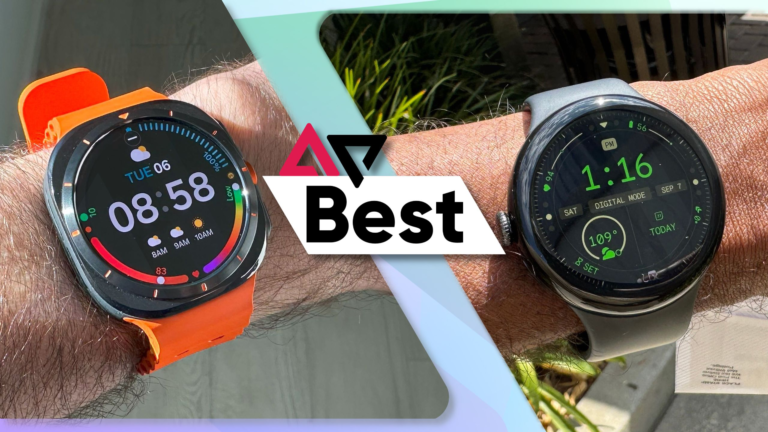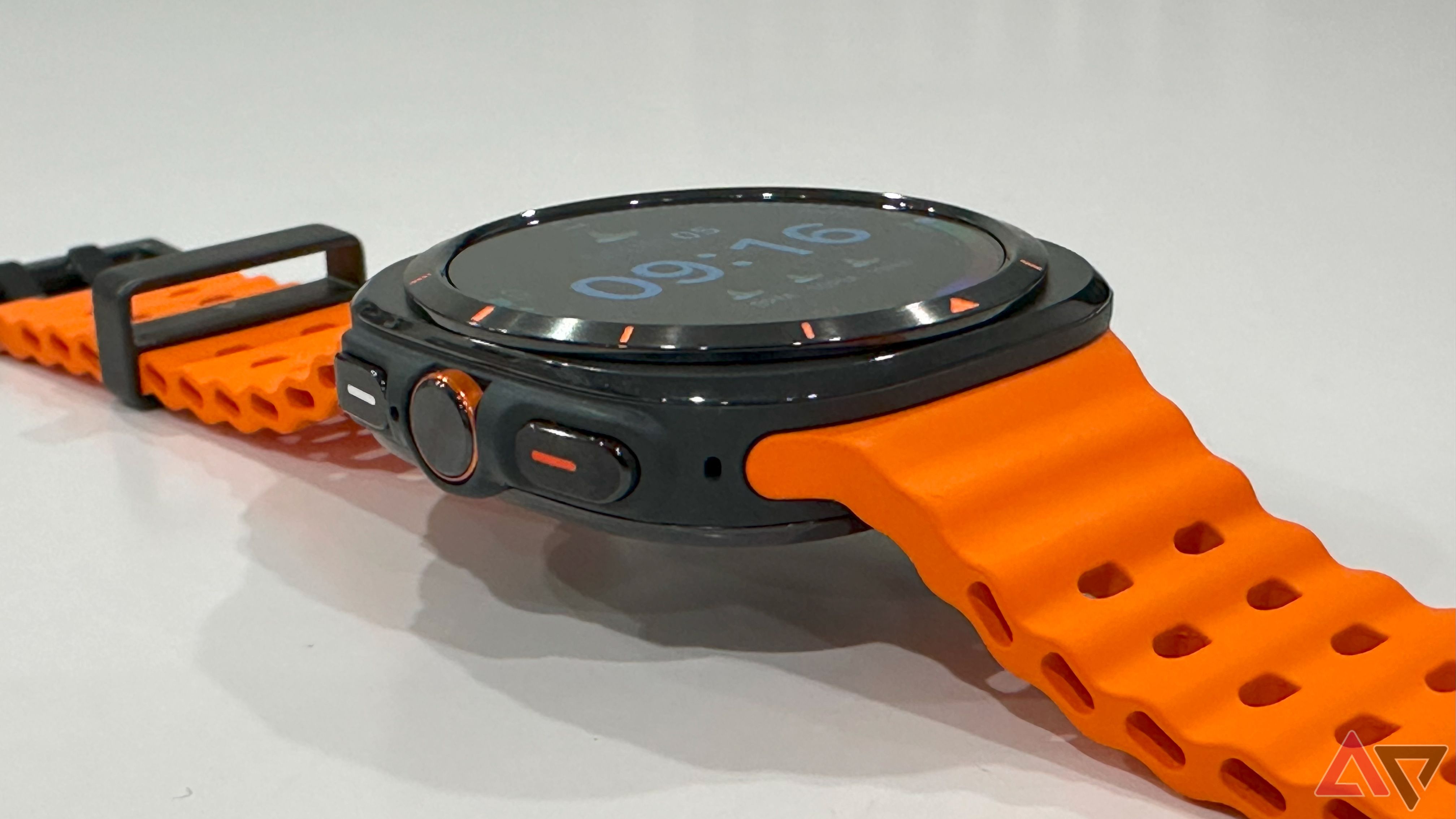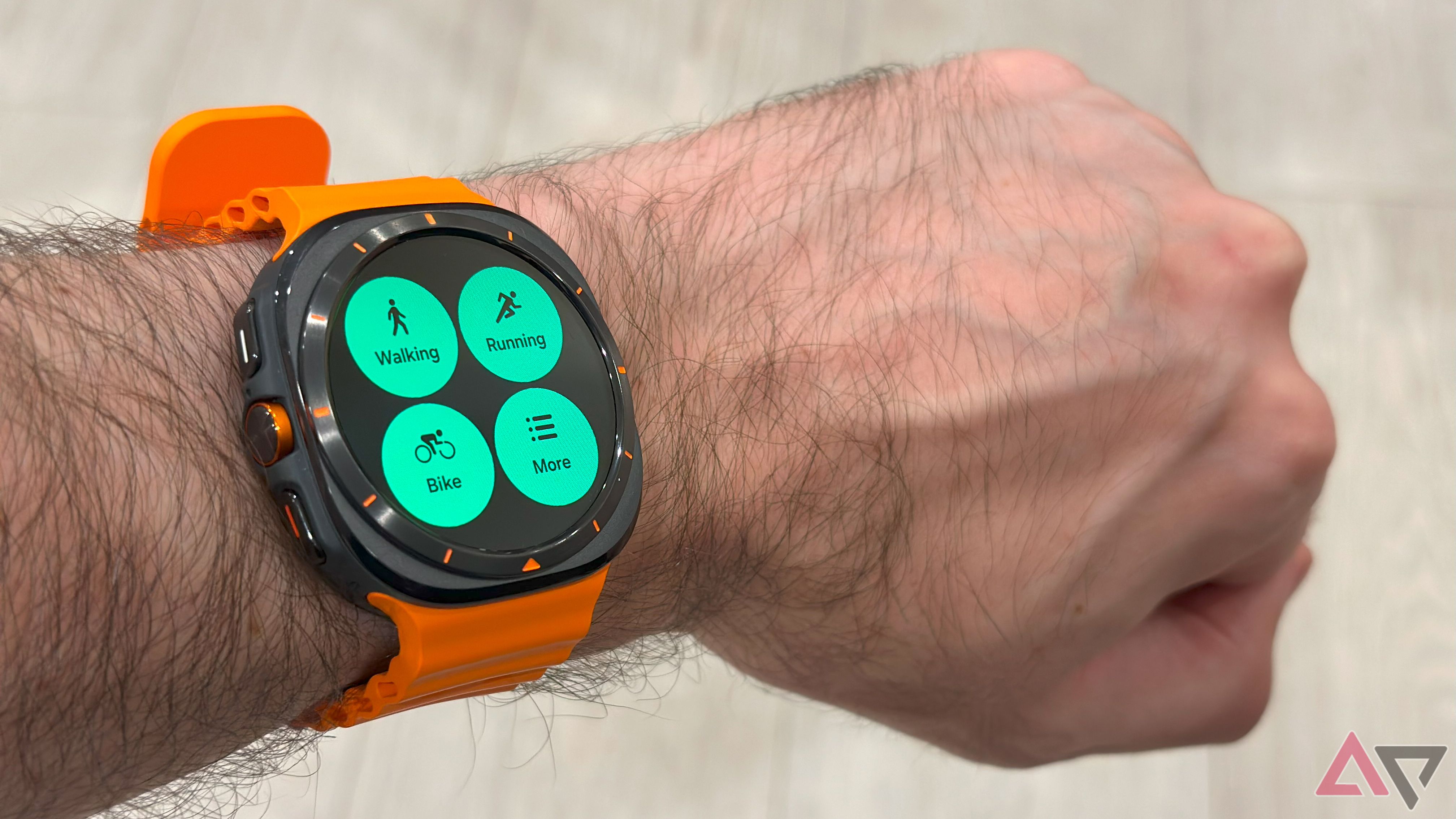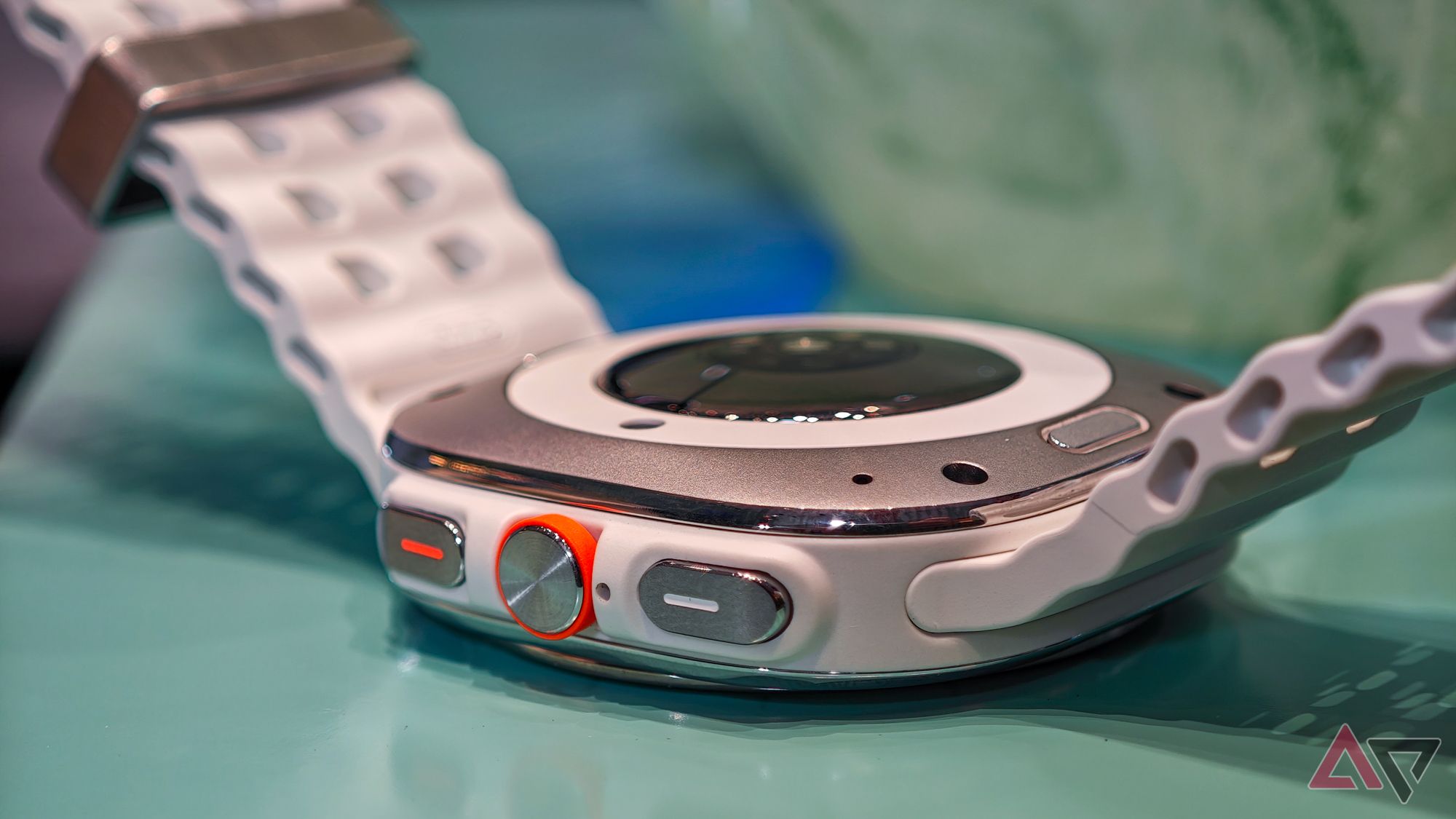-

A rugged choice
Samsung Galaxy Watch Ultra
$482 $650 Save
$168The Samsung Galaxy Watch Ultra is a ruggedized smartwatch built to handle more adventurous and strenuous situations anytime you wear it on your wrist.
Pros- Durable build for outdoor activity
- Quick button on the side
- Longer battery life
Cons- Not suitable for water sports
- Heavier and bulkier
- Expensive
-

A stylish choice
Google Pixel Watch 3
The Google Pixel Watch 3 is a svelte smartwatch that can fit in anywhere, especially when you accessorize it with a different band.
Pros- Comes in both 41mm and 45mm sizes
- Fitbit integration offers great tracking options
- Excellent Wear OS and phone integration
Cons- Not as rugged as other smartwatches
- Need Fitbit Premium to unlock all features
- Proprietary band connectors
Samsung ventures back into rugged territory with the Galaxy Watch Ultra, adding a tougher model to its existing lineup of wearables. That stands in contrast to the svelte and stylish design of the Google Pixel Watch 3, which makes comparing these two somewhat of an apples and oranges situation. However, since these are both Wear OS smartwatches, there are some similarities between them.
It’s no surprise that both are among the best smartwatches for Android, so covering the differences should make this an easy decision.
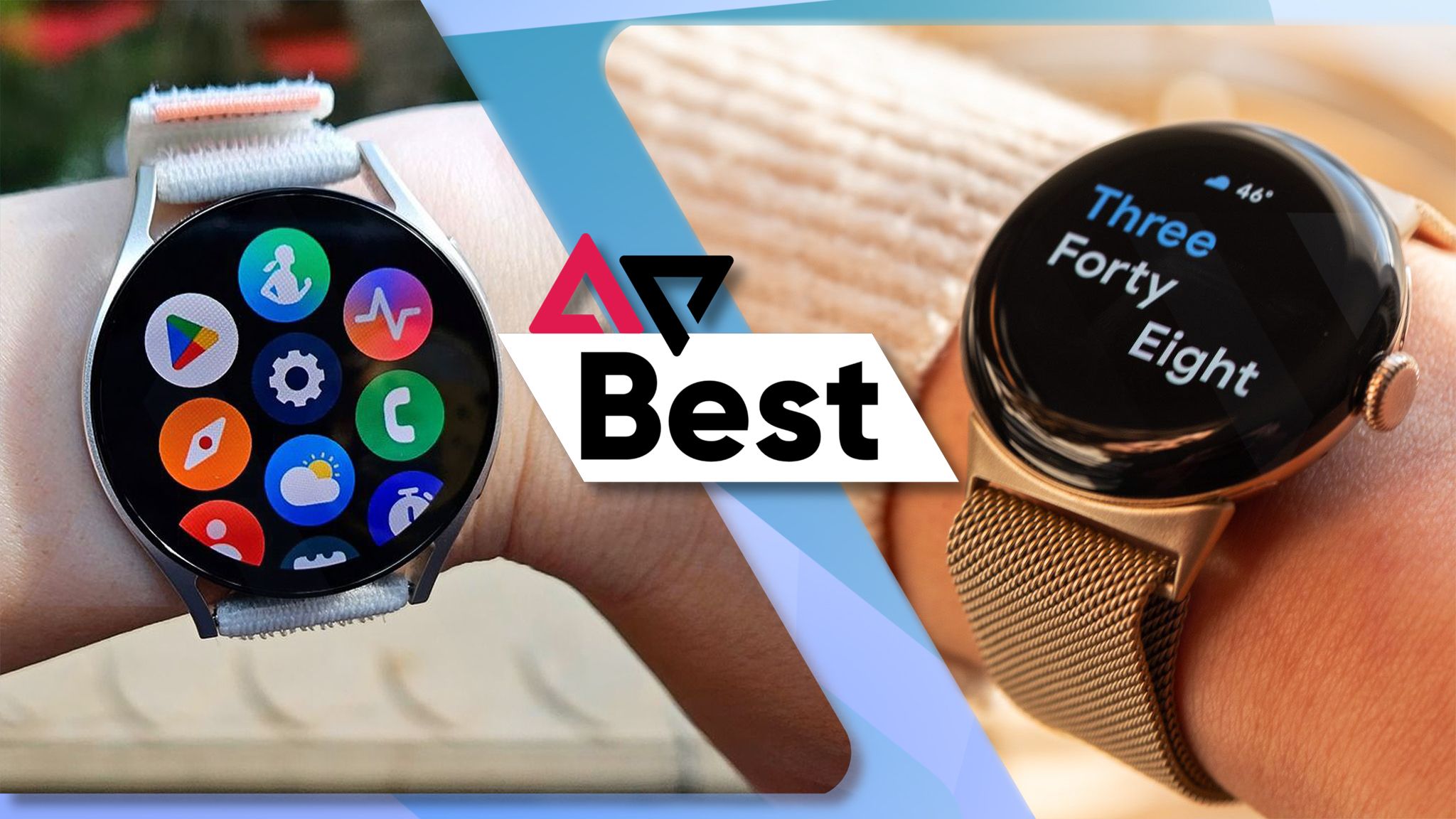
Read our ranking
Price, availability, and specifications
The Galaxy Watch Ultra doesn’t come cheap at $650, making it the most expensive Samsung smartwatch right now. It only comes in a 47mm size, and includes LTE connectivity to go with standard Wi-Fi and Bluetooth, so there are no hardware variants with different features or functions.
However, there are aesthetic choices; the watch comes in Titanium Gray, Titanium White, or Titanium Silver, with either Marine, Trail, or Peakform bands to go with it. Since it’s a larger device, bands only come in medium/large sizes.
You can offset some of the expense by going through Samsung’s trade-in deals, where it’s willing to take its own wearables and those from competing brands, including Google, Apple, Garmin, and Fitbit.
The Google Pixel Watch 3 starts at $350 for the 41mm model and $400 for the 45mm model with Wi-Fi and Bluetooth. The LTE variant for either size costs an extra $100. Color options for the 41mm include Matte Black with an Obsidian band; Polished silver with a Porcelain or Rose Quartz band; or Champagne Gold with a Hazel band. The 45mm comes in Matte Black with an Obsidian band; Polished Silver with Porcelain; or Matte Hazel with a Hazel band.
Google also has its own trade-in program that accepts Google, Samsung, Apple, and Fitbit wearables.
The specs differ very much between these two in a number of ways, but they also line up in certain ways, too:
-
Samsung Galaxy Watch Ultra Google Pixel Watch 3 Case size 47mm 41mm; 45mm Case Material Titanium Aluminum CPU Samsung Exynos W1000 Qualcomm Snapdragon W5 with Cortex M33 co-processor Storage 32GB 32GB Battery 590mAh 306mAh (41mm); 420mAh (45mm) Health sensors Optical bio-signal; electrical heart signal; bioelectrical impedance; temperature Optical heart rate, SpO2, ECG, continuous EDA, skin temperature Dimensions 47.4 x 47.4 x 12.1mm 41 x 41 x 12.3mm (41mm); 45 x 45 x 12.3mm (45mm) Weight 60.5g 31g (41mm); 37g (45mm)
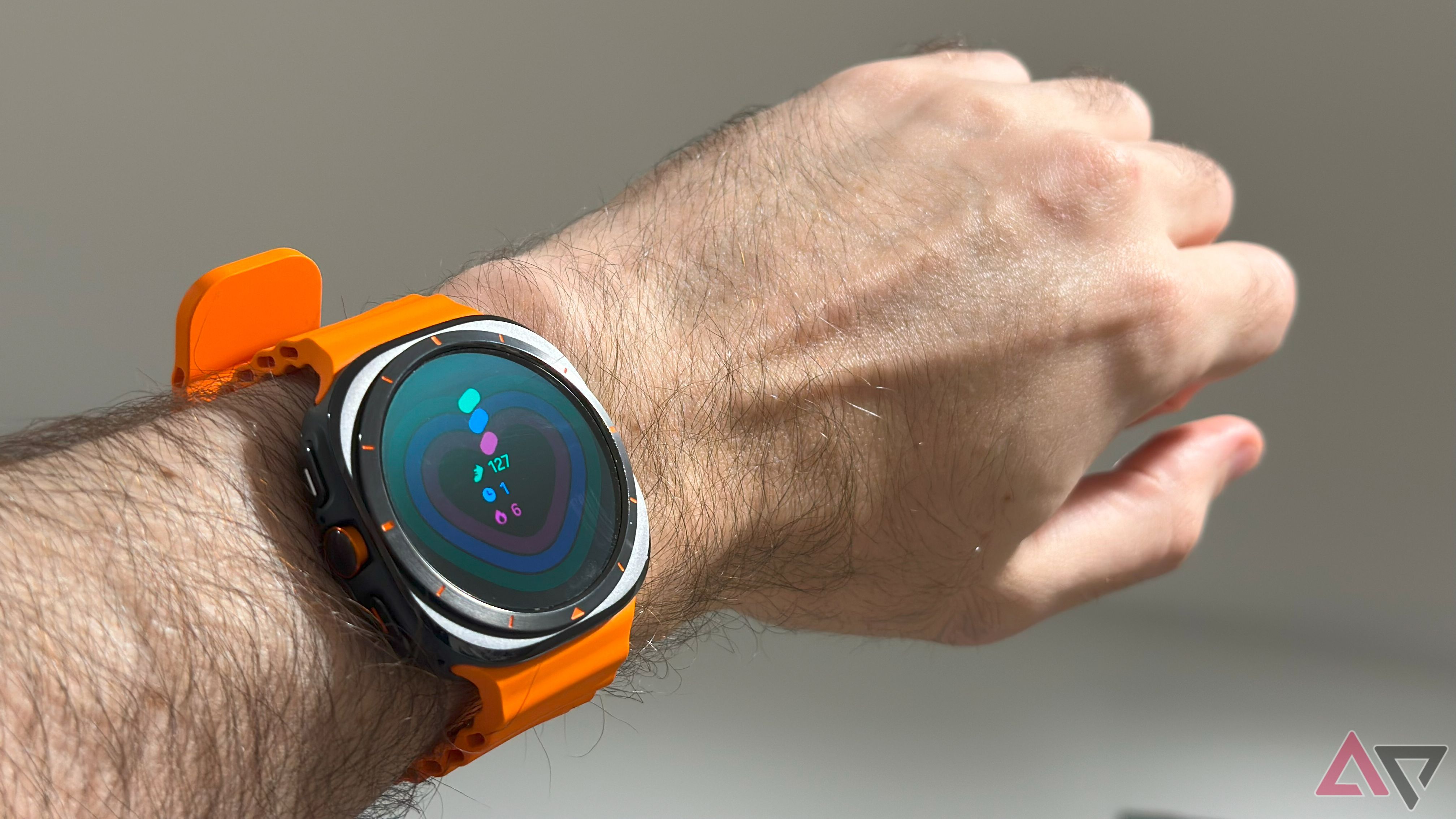
Read our review
Samsung’s Galaxy Watch Ultra is great, but it’s not for everyone
A great watch, but you might prefer the Galaxy Watch 7
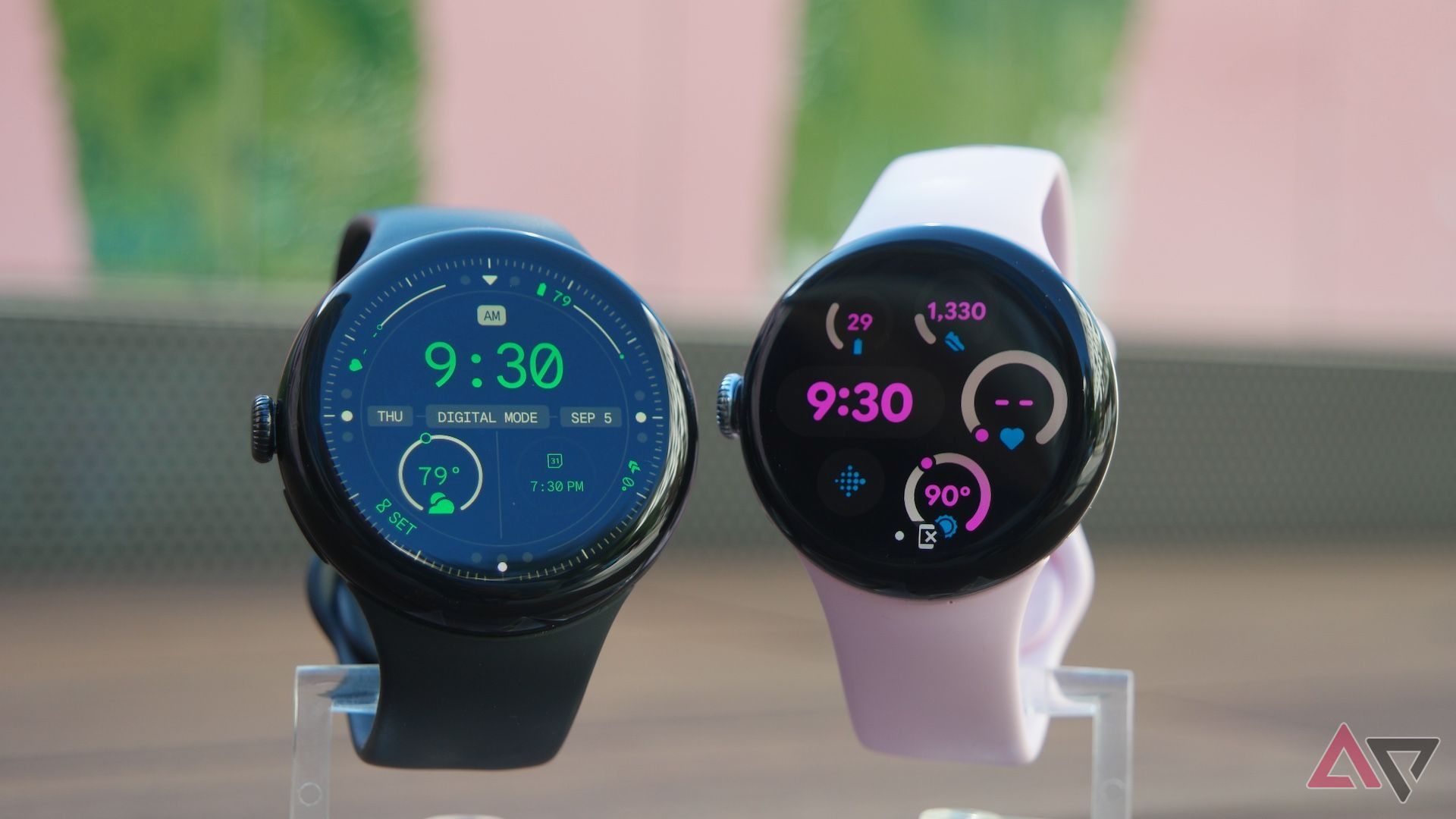
Read our review
Review: Google’s Pixel Watch 3 is big, beautiful, and brainy
The 45mm version is large and easy to love
Design
Beast and the beauty
The Galaxy Watch Ultra carries over much of what Samsung already has in its other models, like the Galaxy Watch 7, and applies additional layers of protection or functionality to make it more adaptable and serviceable in varying situations. On the outside, the customizable Quick button is unique to the Watch Ultra. Just press it to start an exercise or launch a chosen feature.
Other things also set it apart. The screen can go up to 3,000 nits peak brightness so it’s more visible under the sun; the display is covered with Sapphire Crystal, which adds to the durability coming from the titanium body, both of which are big reasons why the Watch Ultra works in temperatures ranging from –4 to 131° Fahrenheit (–20 to 55° Celsius).
While that protection includes 10ATM water resistance, too, Samsung strangely didn’t make the watch tough enough to withstand water sports. You’re better off skydiving with it than diving underwater given its limitations that way.
In contrast, the Pixel Watch 3 bears no resemblance in both aesthetic and concept. Its rounded display and exposed body give it a decidedly slimmer and refined look, which is great for looking nice all the time, but doesn’t do a great deal for roughing it while wearing one.
It’s no surprise, though, given Google clearly likes what it has by not changing its general design philosophy. Adding a 45mm model changes the calculus in that it finally adds a larger size to what was previously a smaller option in the grander scheme.
Google did increase the screen’s peak brightness to 2,000 nits from previous models, though it’s still not as bright as the Watch Ultra. And despite its exposed body, it still has 5ATM water resistance and IP68 protection, so dust and water don’t necessarily pose a major threat to how it works. Plus, you don’t have to always touch the screen to navigate the interface when the rotating crown does such a good job doing that.
Sticking with a familiar design, Google makes it really simple by using the same proprietary connector from the previous model to swap out bands, but this only applies to the 41mm model. That said, watch bands are really easy to find for either size, greatly expanding the types of materials you can attach and where they best fit in.
Software and health & fitness
Fitting in different places
The Galaxy Watch Ultra offers the same software setup as Samsung’s other watches, meaning a combination of Samsung’s One UI with Google’s Wear OS. Health and fitness tracking mainly run through the Samsung Health app using the watch’s BioActive sensors and Body Composition scores.
Where the Ultra diverts is its ability to track multi-activity workouts and training regimens. If you’re getting ready for a marathon or triathlon, this is a Wear OS watch that can prepare you for the grind.
It’s not just runners, either. Functioning Threshold Power estimates are there for cyclists who need additional help in knowing where they struggle along a route. Samsung Health works just fine with other Android phones, but Samsung devices can do more. That’s how you can use the ECG (electrocardiogram) and blood pressure monitoring (if you’re in a region that supports it), plus an “Energy Score” that aggregates your daily activity, weekly sleep, average sleeping heart rate, and sleeping heart rate variability.
The Quick button is nice to have as a shortcut, especially if it’s your chosen method to kick off an exercise or launch a specific feature, like a stopwatch, alarm, or built-in flashlight, among other things. You can’t use the button as an app launcher, so if you want to, say, quickly access music on the device, there’s no way to do it with the Quick button.
As a Wear OS stalwart, the Pixel Watch 3 is a trendsetter if viewed from a software perspective. Google should, in theory, hold an advantage here because it owns Wear OS, but there are particulars that set it apart.
On the health and fitness side, that’s definitely integrating Fitbit into the larger equation, which not only brings in all the familiar tracking features and metrics, but also includes special ones, like Readiness, Target load, Cardio load, and Morning Brief. You can go the extra mile by subscribing to Fitbit Premium (new subs who buy a Pixel Watch 3 get the first six months free), which offers a multitude of workout routines and even recipes.
The only thing is, the full gamut isn’t as extensive here. For example, there is no ECG or BPM available, though you do get blood oxygen and skin temperature sensors to help find clues for potential sleep apnea, or if you might be coming down with something due to fluctuating skin temperatures.
The phone you’re using also plays a role here, because both brands have their own respective handsets. You could very easily cross over between them, since a Pixel Watch 3 will work with a Samsung phone, while a Pixel phone can work with a Galaxy Watch Ultra, but the exclusive features may give you pause on which way to go.
For example, notifications via Wear OS are fairly standard, but could be more actionable when paired with a phone from the same brand. Moreover, you can control the phone’s camera from the watch if the two brands match. The Pixel phone’s Call Screening features also apply to the Pixel Watch 3, much like Bixby Routines do for Samsung devices (should you use Bixby).
You can control smart home devices directly from either watch, too, and AI promises to play some kind of role with both going forward through pending updates.
Battery life
Getting through a full day
Neither brand can make any big claims here. A bigger body in the Galaxy Watch Ultra bodes well for this rugged watch on paper, but at best, you’re looking at up to 24–36 hours per charge. Under the circumstances, that’s better than other Samsung watches, but as far as rugged watches go, it falls well behind others from the likes of Apple, Garmin, Suunto, and Coros.
The Pixel Watch 3 isn’t that much better. The 41mm model can go up to 24 hours, with the 45mm hitting closer to 36 hours. At least it only takes 28 minutes to go from zero to 50%, a marked improvement from its predecessors.
Despite their unique differences, both the Galaxy Watch Ultra and Pixel Watch 3 are susceptible to the same battery performance challenges. Constant tracking, GPS, and the always-on display are the biggest drainers. Keep the chargers handy because you can’t just drop these onto a Qi charging pad to charge up again.
Which should you buy?
This choice mostly comes down to what you want your smartwatch to do. If you have rugged pursuits in mind, then the Galaxy Watch Ultra is the obvious choice because it can take more punishment than the Pixel Watch 3. You could argue the health and fitness tracking features are a wash, but again, the extras Samsung throws into its Ultra watch are more conducive to those who want to get more out of their workouts and training.
There’s no confusing the Watch Ultra’s purpose. It may be bulkier and heavier than other standard models, but it’s also a rare opportunity to use Wear OS on such a rugged device.

Take it outside
Samsung Galaxy Watch Ultra
$482 $650 Save
$168
The Galaxy Watch Ultra is Samsung’s latest attempt at a ruggedized watch to compete with established models that already do the same.
The Pixel Watch 3 isn’t just a flashy timepiece, though, it’s a functional smart device on your wrist. With a different band, it has no problem fitting in for just about any occasion, not to mention a more comfortable time while tracking sleep. That makes it a compelling choice for design and functionality, but not necessarily the ideal choice if you expect to be in rougher terrain fairly often.

Wear it with style
Google Pixel Watch 3
The Google Pixel Watch 3 sticks to a familiar design, while also adding a larger size, keeping its design and functionality very familiar throughout.
